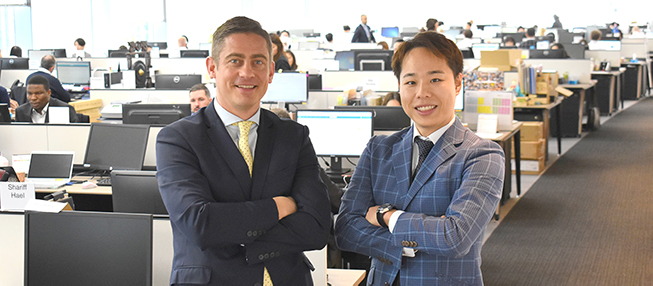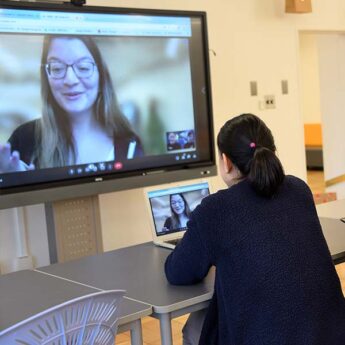In today’s candidate-short market, skilled bilingual professionals are in great demand. RGF Professional Recruitment Japan (RGF PR) is a bilingual recruitment arm of Recruit Group, the largest recruiting and information service firm in Japan and Asia and the fourth-largest in the world.
In January 2018, Recruit Global Family launched the Contract Business Division to offer complete staffing solutions to its clients. “Our goal is to become not only the number-one recruitment firm in Japan, but also the number-one recruitment firm in Asia,” said Director Benjamin Cordier, who joined RGF PR specifically to launch the contract division.
RGF PR has achieved significant growth, leading to an increase in the number of consultants from 83 to 150 in one year. “I believe the job-changing market is getting richer and more prevalent. Younger people are more willing to change jobs now,” said Manager Takuya Sakamoto, who also joined to establish the division.

Global mindset
RGF PR places bilingual Japanese professionals—as well as non-Japanese with excellent language and technical skills—in global firms and Japanese enterprises looking to expand overseas.
“Being part of the Recruit Group here in Japan is obviously a very strong advantage for us,” said Cordier. “The fact that we are part of the Recruit Group earns us initial trust when people are looking to change jobs. We are also benefiting from the size of Recruit in terms of the number of candidates in our database, which is by far the largest advantage we have compared with our competitors”.
In Japan, the Recruit brand is recognised for its credibility and trust, and access to Recruit’s database allows RGF PR to provide highly qualified candidates to clients. Its international recruiting expertise—along with a network of 45 offices throughout Asia—allows RGF PR to reach many skilled bilingual and bicultural returnee candidates before competitors.
“RGF Professional Recruitment’s objective is to become the number-one recruitment firm in Japan; and we don’t think we can achieve that by just doing permanent placement,” said Cordier. “We have to offer clients our full, more flexible solutions. Permanent positions, contract positions, or haken [temporary staff], were the driving forces behind building the division”.
Bright outlook
Based on the first year’s very strong growth, Cordier foresees that, with continued momentum, RGF PR will achieve in four years what took competitors 10. They plan to have a big summer party to celebrate this success with all of their haken staff.
“In terms of the number of placements made in the Japan market, contract is double that of permanent positions, which means big potential,” said Sakamoto. Contract hires offer more flexible, faster hiring options with reduced fallout from mismatches when the budget is temporarily tight. Some candidates tend to focus on permanent employment—especially in a strong economy—but “both the client and RGF PR need to understand the benefit of contract employment, which often pays better than permanent jobs or flexibility in terms of working hours or duration,” he added.
Cordier also touched upon changes where some “people prefer to be contractors—especially in IT, where you may have a quite senior-level person who prefers to work three to six months to do system implementation, then take three months off and go surfing in Bali”. They can do that, he said, because they know there will be offers upon returning, given their skills.
“Some people prefer the gig economy style of working,” he continued, “and as consultants we need to educate our clients on the market and increasingly more flexible workstyles for people such as working mothers. The way people work is changing, with more mobility and flexibility”.
For two big upcoming sporting events—the Rugby World Cup 2019 and the Tokyo 2020 Olympic and Paralympic Games—RGF PR is already working with various clients on project-based hiring or contracts.
Market potential
Lastly, Cordier mentioned the firm’s tagline: Unleash Potential. It is something they strongly believe in. “We want to help our clients realise the potential in our market, but also want to help our candidates to achieve the potential within their careers”.
Sakamoto shared an impressive story. “Usually we use our database when we look for bilingual candidates, but the database is not always how we find candidates. There was a convenience store clerk from Uzbekistan—fluent in Japanese with amazing customer service skills. I put him up for a job at a data centre that needed bilingual engineers. He was hired and eventually became the centre leader. It was a win–win situation. On top of using our database, we need to come up with creative ideas when searching for good candidates”.





